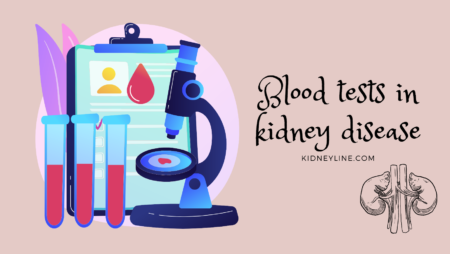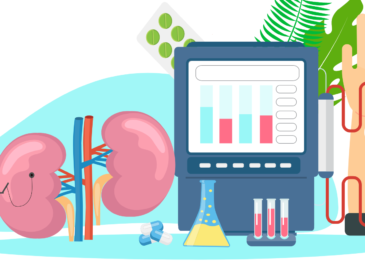Blood tests are essential if you have chronic kidney disease (CKD). Doctors use them to detect CKD, check for complications and monitor the progression of the disease.
The kidneys remove waste and regulate the levels of several substances. By measuring the levels of different molecules, your health team can tell how well your kidneys are working. Here are some blood tests that will be needed. Additional tests may be requested depending on your medical condition.
Serum creatinine
Creatinine is a waste product of muscle metabolism. Everyone has creatinine in their blood. However, the creatinine level depends on age, gender, body weight and race.
Healthy kidneys remove creatinine via urine, preventing them from getting too high. But when you have chronic kidney disease, creatinine levels gradually rise.
Doctors use the measured serum creatinine to tell how well your kidneys filter blood by calculating the estimated glomerular filtration rate (eGFR). The eGFR is used to stage kidney disease. You have CKD if your eGFR is less than 60ml/min/1.73m2
Your doctor is going to request this blood test from time to time. This is how doctors monitor how the disease progresses over time.
Testing for serum creatinine does not require any preparation. So, the samples can be taken at any time.
Serum urea
Urea is a waste product of protein metabolism. This means it is found in everyone’s blood, just like creatinine. The kidneys also excrete urea in urine, and urea builds up when there is kidney dysfunction.
Unlike creatinine, doctors don’t use urea to calculate eGFR because factors other than kidney disease can lead to high urea levels. For example, eating lots of protein can lead to an increase in urea. Most times, tests for kidney function provide results of urea and creatinine levels.
Serum electrolytes
Potassium
This is an essential mineral found mainly inside the body’s cells. It is critical in many cellular functions, including energy production, blood pressure regulation and fluid balance.
The kidney maintains the delicate balance of potassium needed for the body to function properly.
With kidney dysfunction, it is easy for potassium to build up in the blood. High potassium levels can affect the function of nerves, muscles and the heart. As a result, some people may experience weakness, and some may develop abnormal heart rhythms.
In addition, some of the drugs used to treat kidney disease can lead to abnormally high potassium levels. As such, your doctor may request to check your potassium levels from time to time.
Bicarbonate
Serum electrolytes test also checks for bicarbonate levels. This is a measure of how acidic the blood is. The kidneys maintains the pH of the body. During metabolism, the body produces acids that’s typically excreted by the kidneys. But when there is kidney disease, there may be difficulty eliminating acids leading to acidosis. This shows up in the tests as low serum bicarbonate. Your doctor may place you on sodium bicarbonate if this happens.
Maintaining the right pH is crucial because too much acids can impair many cellular functions. Experts also say acidosis leads to a faster decline in kidney function. Furthermore, acidosis can worsen bone disorders in people with chronic kidney disease.
Full blood count or complete blood count
A full blood count can tell your healthcare team if you have low blood levels. Anemia is common in CKD. This is because the kidneys produce erythropoietin, a hormone that helps the bone marrow produce red blood cells. People with CKD also have iron deficiency which can contribute to anemia. Your doctor may prescribe iron supplementation and erythropoietin injections if you have anemia.

Phosphate
Phosphate is an essential mineral that is critical in energy generation and cellular function. In addition, it is important for nerve and muscle function. The kidneys excrete excess phosphate. So, when there is CKD, phosphate builds up. Excess phosphate can lead to bone disease, cardiovascular disease and even death. The serum phosphate test does not need any special preparation. Your doctor may prescribe medications that bind phosphate in the gut if serum phosphate is high. Your dietitian may also recommend dietary changes.
Vitamin D
The body produces vitamin D in an inactive form. The kidneys are responsible for converting Vitamin D to its active form. Vitamin D is a fat-soluble vitamin that helps with bone health. It helps absorb calcium and phosphate, which are essential in building healthy bones. Vitamin D levels are affected by several factors, including exposure to sunlight and diet. Because people with CKD are prone to having Vitamin D deficiency, doctors monitor vitamin D levels. If you have vitamin D deficiency, your doctor may suggest supplementation.
Calcium
Calcium is an important mineral in cell function. It maintains bone health, helps the heartbeat and helps nerves and muscles work properly. Calcium is principally stored in the bone. Active vitamin D helps us absorb calcium from the gut. When there is CKD, the kidneys cannot activate vitamin D. This deficiency of vitamin D can cause low calcium levels. If the phosphate level is also high, phosphate can bind to calcium and further lower serum calcium levels
People with CKD may also develop high calcium levels. When calcium and vitamin D levels are low for prolonged periods, parathyroid hormone levels may get high. Parathyroid hormone causes calcium to leach from the bones into the blood and cause hypercalcemia. As such, your doctor may also request parathyroid hormone levels.
Wrap-up
If you have CKD your doctors will ask you to do these blood tests routinely. This allows them to monitor the progression of disease and the presence of complications. Your test results and other clinical findings will guide your doctors on the next steps in your care.



